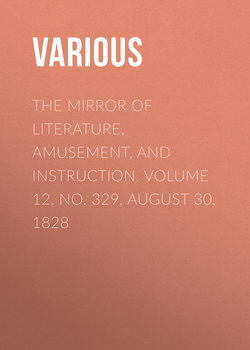Читать книгу The Mirror of Literature, Amusement, and Instruction. Volume 12, No. 329, August 30, 1828 - Various - Страница 2
NEW CHURCH, BUILDING AT STAINES
THE SPECTRE'S VOYAGE
Оглавление(For the Mirror.)
"There is a part of the river Wye, between the city of Hereford and the town of Moss, which was distinguished and well known for upwards of two centuries, by the appellation of the Spectre's Voyage; across which, so long as it retained that name, neither entreaty nor remuneration could induce any boatman to convey passengers after a certain hour of the night. The superstitious ideas current amongst the lower orders of people were, that on every evening about the hour of eight, a beautiful female figure was seen in a small vessel, sailing from Hereford to Northrigg, (a small village about three miles distant,) with the utmost rapidity, against wind and tide, or even in a dead calm—landed at the little village, returned, and vanished, when arrived at a certain part of the river, where the current is remarkably strong, about half a mile from the city of Hereford."
–Neele's Romance of History. See MIRROR, vol. x, page 352.
Bright shines the silver queen of night,
Upon fair Wye's soft stream;
Which throws a ray of heavenly light
Reflected from her beam.
Yet this smooth water, wide and clear,
This scene of sweet repose;
Erst filled the villagers with fear
As ancient story goes.
'Tis told us that in dead of night,
(In days of yore long past)
A skiff was seen compact and light,
With sail, and oars, and mast.
And in it sat the spectral form,
Of a most beauteous maid;
Who heeded neither wind nor storm,
As she this voyage made.
Nor heeded she the pelting rain,
Nor winter's blinding snows;
But to the destin'd spot amain,
The scudding vessel goes;
Or if so calm, the placid Wye,
No wave was on its face,
Yet onward did that light bark fly
To reach the fated place.
When on the deck she was espied,
Each trembled to behold;
As on she sail'd 'gainst wind and tide,
('Tis scarce believ'd when told)
Then sail and oar were both applied,
And swift the vessel flew;
But where the man—who could abide
That vessel to pursue?
Ah! who could dare approach the spot
Where Isabel did steer?
That mariner existeth not,
But did that phantom fear.
Or where's the man whose courage bold,
Could lend him strength one hour,
To gaze upon that form so cold,
Or place him in her power.
And when the spectral sail was spread,
That flutter'd to and fro;
The hair would bristle on each head,
Which awful fear did show.
And when the moon-beam seem'd to kiss,
That dreaded maiden's brow;
Something each knew would go amiss,
Nor judg'd such wrong, I trow.
For tho' the form was wond'rous fair,
'Twas terrible to view;
And to avoid it was the care
Of every vessel's crew.
Full many a dismal tale was told,
Of that fam'd spectre ship;
And none were ever known so bold
To watch this nightly trip.
Why did that troubled shade proceed
Along that watery way?
Or what the purpose, or the deed,
Which caus'd her thus to stray?
For good, or bad, did Isabel,
Forsake her dreary grave?
Or was't because she lov'd to sail
On Wye's pellucid wave?
The spectre came to meet her dear,
Lord Hugh—the young and brave;
When dreadful tidings met her ear,
"He'd found a traitor's grave."
When second Edward rul'd this land,
(A wretched prince was he,)
Of favourites he'd a numerous band,
As worthless as could be.
Two noblemen amongst this set
Were hated above all;
And many were the lords who met,
To work the Spencer's fall.
Success attends these foe-men's strife,
Lord Hugh is doom'd to die;
And in his happiest hours of life,
That precious life did fly.
His manly form did never more,
Bless Isabel's fond eyes;
With him—the joys of life were o'er,
For him—the maiden dies.
Yet still the spirit fondly clings,
To what in life has been,
Thus Isabel, it nightly brings
To this beloved scene.
But when her feet have touch'd the ground,
With silent, noiseless tread;
No tender lover there is found,
He's number'd with the dead.
No more of love the tender strain,
Falls on her list'ning ear,
In life—her joy, was turn'd to pain,
Her hope—gave place to fear.
'Tis then, that dread laments they hear,
Who pass by night that way;
Which the scar'd traveller, so clear,
Hears till returning day;
When re-embarks sad Isabel,
That spectre shade so fair;
Then dashing in the water's swell,
She vanishes in air.
No trace remains in Sol's bright ray,
Of boat or awful spright;
For grief—or guilt conceived by day,
Conspicuous is at night.
Thus Isabel's unearthly woe,
Remain'd for many years;
But as our superstitions go,
So go unfounded fears
CAROLINE MAXWELL.
